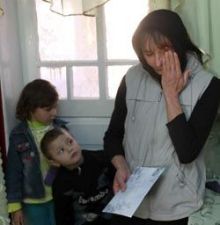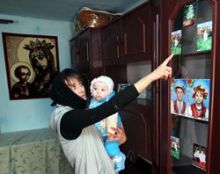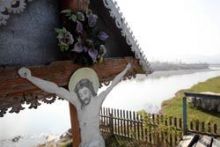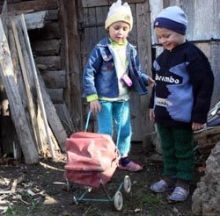VILLAGE OF LANCHYN (IVANO-FRANKIVSK OBLAST) — A photograph entitled Three Children Killed in the Flood, which was submitted to The Day’s 10th photo competition held at Ukraine House in late September, could not have failed to move any of the several thousand visitors to the exhibit. Photographer Ihor Dobrovolsky’s picture was awarded the Golden Day Prize of Prizes.
This award, instituted this year, is the realization of The Day’s editor Larysa Ivshyna’s most cherished dream: she wants this award to serve as an incentive not only to press photographers but ordinary people, who want to help their fellow citizens in times of trouble.
The Day has appealed for support for the Golden Day initiative. Raisa Bohatyriova, the secretary of the National Security and Defense Council (RNBO), was the first to respond.
We drove to Ivano-Frankivsk oblast with our press reporter and Ihor Dobrovolsky, the winner of the Golden Day Prize of Prizes. This quiet young man gave us a brief account of his photo report on the flood, and how he found Olena Ivanochko.
“We went there to take pictures of the floods in western Ukraine toward the end of July. First we visited Chernivtsi and then drove to Sniatyn raion. At the time funerals were being held in practically every village home. We asked around and finally located the woman who had lost three of her children. She showed us pictures of them. I could sense her boundless grief and didn’t know what I could do to help.”
Three months later Dobrovolsky and some journalists from The Day brought a modest amount of cash but a great deal of moral support to the grief-stricken woman and her family.
We drove to Lanchyn, a village in Nadvirna raion, where Mrs. Ivanochko and her family had moved after the tragedy. It is a large village with a population of 8,000. Fortunately, the consequences of the July floods were not as destructive here as in villages in the other affected oblasts. Yet even here, in late July, homes were still inundated up to the hopper frame and in many others houses the water level was 50 cm and higher.
We were met by Maria Popovych, the acting chairperson of the village council. Before taking us to Mrs. Ivanochko’s home, she took us on a guided tour of the village. We saw asphalt roads, neat cottages, and what looked like perfectly safe creeks. “These creeks were the cause of the big trouble, not the river. No one expected that they would turn into powerful torrents. Right now, most of the funds are being channeled into repairing roads and embankments. Thank God, our village didn’t suffer any fatal consequences. The water reached mid-window level in an old village house inhabited by two young families. They have been resettled and their home is empty. Another village house was about to collapse in a ravine across the river. One of its corners was hanging in midair because the flood washed out the foundation.”
Not all the roads in the village have been repaired. Because there is no planked footway, local residents still carry their children across the creek to the village school. Popovych points to a house that is locked and deserted after being damaged in the flood.
She says people have received compensation, but there is a problem with payments for damaged farmlands. Only half of all farmers who are eligible for compensation for losing their vegetable plots (mostly potatoes) got them, but the other half received nothing. Popovych knocked on every office door in the raion and oblast, only to be told that no more funds were forthcoming. People are justifiably angry. We saw an elderly woman brandishing her fists at Popovych, shouting that she wanted to receive the promised compensation.
We returned to Mrs. Ivanochko’s home, where she and her husband Andrii were waiting for us. They bought this house recently and moved in the previous week, after completing some repairs.
We were welcomed inside and saw three-year-old Oleksii and five-year-old Marusia hiding behind their mother. The little boy was the only survivor of the four children who were caught in the flood and drowned. He was miraculously resuscitated. Now he was happily playing with his sister, casting curious glances in our direction.
“Oleksii, where’s Inna, Vasko, and Tania?” asks the woman. The little boy whispered something back. “He says they’re gone,” his mother explained, “and whenever I tell him we’re going to visit his grandmother (in the village where the tragedy took place — T.M.) he gets scared and doesn’t want to go, saying there’s ‘big water’ there. I’m still scared to visit the place, too.”
That night Mrs. Ivanochko was not in the boat with her husband Andrii, who is still in shock: “There was panic, and the boat was overloaded. Maybe if it hadn’t been covered...We were crossing the Prut in a motorboat...Everything happened right before my eyes. Water was pouring inside, and everyone was panicking. The shrieks and cries... And that was it. It happened in an instant, and at first no one could understand what had happened.”
The father said that he was in the icy water for two and a half hours, holding onto a bush. But there was nothing he could do. Besides his three children, two other children and three women drowned. His wife attended the funeral of her 10-year-old daughter Olena, 8-year-old son Vasylko, and the youngest, 2-year-old Tetiana, without her husband, who became seriously ill after the tragedy. When Vasylko, who was found first, was being buried, his father fainted and people had to carry him home.
His wife found the girls’ bodies a few days later. “My eldest daughter Inna was like a nanny to my other children. She helped raise them. Wherever I go, she is before my eyes and I keep crying. I want to chew on a rock; my heart is breaking from grief. People keep asking how I could have endured all this. It’s so hard! Three children gone! They were never sick, never had to be taken to the hospital. But the funeral was easier to endure than this emptiness at home now. I look around at what I have bought with the compensation for my dead kids, and they’re gone. I didn’t earn this money, they did, and I lost them forever...Do you know something? My children said goodbye to me. I was going to the bazaar The Day before, and my eldest and youngest daughters wouldn’t leave me alone. The eldest one hugged me and asked, ‘Mama, will you come back tomorrow?’ And then she started crying.”
Mrs. Ivanochko says that some of the villagers are envious about her compensation of 20,000 hryvnias. She would gladly give it away if only her children were still alive.
She says the district administration promised to buy them a house. They waited for one month, and then decided to buy one on their own. She showed us a repaired three-room house and the new furniture. Some finishing touches are left: doorjambs have to be painted and fixtures have to be installed. They moved in with nothing, because everything they owned was destroyed in the flood. They had to buy everything, including spoons and knives.
Our conversation woke up six-month-old Petrus, who was sleeping in the next room. His mother picked him up and the chubby-cheeked child smiled. Her mood lightened.
“People say I have three children left. It’s true. I have a reason to live.”
After getting to know the family members, we told them about the purpose of our visit and gave them the money we had brought from far away.
“This money is proof that help can come from out of the blue,” The Day’s press photographer said. “I was taking pictures during the launch of the photo exhibit and saw how people were responding to the flood pictures. Raisa Bohatyriova was deeply moved by your story and by the photo. As a woman and mother, she could not sit by idly. These 20,000 hryvnias are from her.”
Mrs. Ivanochko thanked us. When we asked her how she intended to spend the money, she replied: “I want to have access to the gas pipeline. This is a big house, so if I don’t get it now, God knows when I’ll get it later. We have bought everything else we need, but you have to pay a lot for gas these days.”
The acting village council chairwoman added: “This building is not linked to the gas pipe, but we’ll take care of this. We’ll help them fill out the sales contract because they aren’t officially registered yet. We’ll do our best to help them in every way.”
Mrs. Ivanochko can hardly believe that she has a home of her own; the family had always rented flats. The family spent two years without official registration, so she was not entitled to government assistance for large families. She and her husband collected birch twigs and made brooms. “I’ll keep making birch brooms to support my kids. I will do all the domestic chores, and I’ll buy five or eight sows, paint the ceiling, and fix up the threshing barn.” As she talked about her plans, her grief-stricken face seemed to brighten, and we realized that this woman is strong and wants to live.
Of course, no amount money will ever bring the children who perished in the flood back to their parents, but support and help from their fellow citizens will help heal the bleeding wounds in their hearts. We hope that the newspaper’s initiative receives support for the many people who are still in need of assistance.
Ruslan KANIUKA, The Day’s press photographer:
A press photographer’s job is anything but simple. You often have to take pictures of things you would prefer never to see. You feel for the subjects of your pictures; you feel their emotions. But photographs like this must be taken. If Ihor Dobrovolsky had not been in that village and never submitted his photo to The Day‘s photo competition, few people would have found out about this family.
Ihor Dobrovolsky, winner of the Golden Day Prize of Prizes for his photograph Three Children Killed in the Flood:
When I was doing my report, I was misinformed. I had been told that this woman had lost all her children. Last week when we visited her, I saw that she had three children left. Needless to say, this didn’t make the tragedy any easier to endure, but I felt a little better because I knew she still had a reason for living. I used to work as an investigator with the Road Directorate. I have seen lots of accidents, including fatal ones. Hardly anything surprises me, but I was crying when I was taking pictures of the flooded areas and the victims. Many people were simply unprepared for the scope of this disaster. I’m happy that my photo report has helped at least one family.










